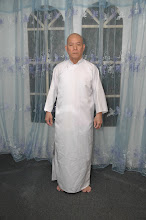Chapter 2 --Communion Through Knowledge
Sanjaya said: To him who was thus overcome with pity and whose eyes were full of tears and bore a bewildered look, Sri Krsna spoke as follows.
The Blessed Lord said: O Arjuna! Whence has this loathsome stupidity (I also use this word to screw people) come upon you in this crisis? It (this attitude) is unworthy of a noble personage; it is a bar to heaven and a cause of much disrepute.
O Partha! Yield not to unmanliness! It befits thee not. Abandoning this base faint-heartedness, rise up, O dreaded hero!
Arjuna said: O Krsna! How can I attack Bhisma and Drona in battle with my arrows? They are, indeed, worthy of worship, O destroyer of foes!
It is indeed better to live here in this world on a beggar's fare than to prosper by killing these venerable teachers. The enjoyment of pleasure and power obtained through the slaughter of these teachers and elders will surely by bloodstained.
We do not know which of the two (alternatives) will be the better--the one that we should conquer them or the other that they should conquer us. The men on the side of Dhrtarastra, standing arrayed against us are the very people after killing whom we should not care to live.
My natural disposition is vitiated by a sense of pity, and my mind is in utter confusion regarding my duty. Lord, I beg Thee, tell me with certainty what will lead to my good. I am Thy disciple. Instruct me, who have taken refuge in Thee.
I do not find anything that can assuage this grief which numbs my senses. Neither the unchallenged lordship over a prosperous kingdom, nor even the overlord-ship of all the Devas can do so.
Sanjaya said: Addressing Sri Krsna, the master of the senses, (the master, Mind) Arjuna, though valorous and vigilant said, 'I will not fight', and sat silent.
O King! To him who was thus sitting grief-stricken between the two armies (instead of fighting), Sri Krsna said as if by way of ridicule.
The Blessed Lord said, 'You are moaning for those who should not be moaned for. Yet you speak like a wise man. The truly wise never weep either for the dead or for the living.
Never was there a time when I did not exist, nor you, nor these rulers of men. Nor shall all of us cease to be hereafter.
Even as the attainment of childhood, youth and old age is to one in this physical life, so is the change to another body (at death) for the embodied soul. Wise men are not deluded by this.
Contact of the senses with their object generates cold and heat, pleasure and pain. They come and go, being impermanent. Bear with them patiently, O scion of the Bharata race!
O leader of men! That enlightened one who is unperturbed alike in pleasure and pain, whom these do not distress--he indeed is worthy of immortality. (we have to maintain a neutral state of mind in our worldly affair - that is no emotion)
The unreal can never come into existence, and the real can never cease to be. The wise philosophers have known the truth about these categories (of the real and the unreal).
Know that Reality, by which everything is pervaded, to be indestructible. No one can cause the destruction of this immutable Being.
What is said to perish are these bodies, in which the imperishable and unlimited Spirit is embodied. Therefore fight, O scion of the Bharata race!
He who thinks him (the self) to be the killer, and who experiences him )the self) as the killed--both of them know not. He (the self or Spirit) neither kills nor is killed.
He (this Spiritual Self) has neither birth nor death. (same as Jesus Christ) Nor does he cease to be, having been in existence before; unborn, eternal, permanent and primeval, he (the Spirit in our body) is never killed when the body is killed.
O Arjuna! know this self to be eternal, un-decaying, birth-less and indestructible. A person who knows him to be so--how and whom can he kill, how and whom can he cause to be killed?
Just as a man gives up old garments and puts on new ones, so the embodied self abandons decrepit bodies and assumes new ones.
Him the weapons cleave not; Him the fire burns not; Him the waters wet not; Him the wind dries not.
He cannot be cut or burnt. He can neither be wetted nor dried. Eternal, all-pervading, immovable and motionless. He is the same for ever.
Knowing Him (the self) to be un-manifest, inconceivable, and un-modifiable, it is improper to mourn for Him. (then why we have funeral rites)
In the alternative, even if you hold him (the self) to be subject to constant births and deaths, there is no justification, O mighty armed, for your mourning for him.
For the born, death is unavoidable, and for the dead birth is sure to take place. Therefore in a situation that is inevitable, there is no justification for you to grieve. (Life is just like that. We are just actors.)
This chapter 2 tells us the Self Nature inside our body is the Supreme Being.
Therefore I don't attend funeral or pray to dead body. I don't pray to ancestors and all other Gods or statues. The Self Nature inside me is my Only God.
It has to be Sealed, so that we can return to our source, the VOID.

No comments:
Post a Comment